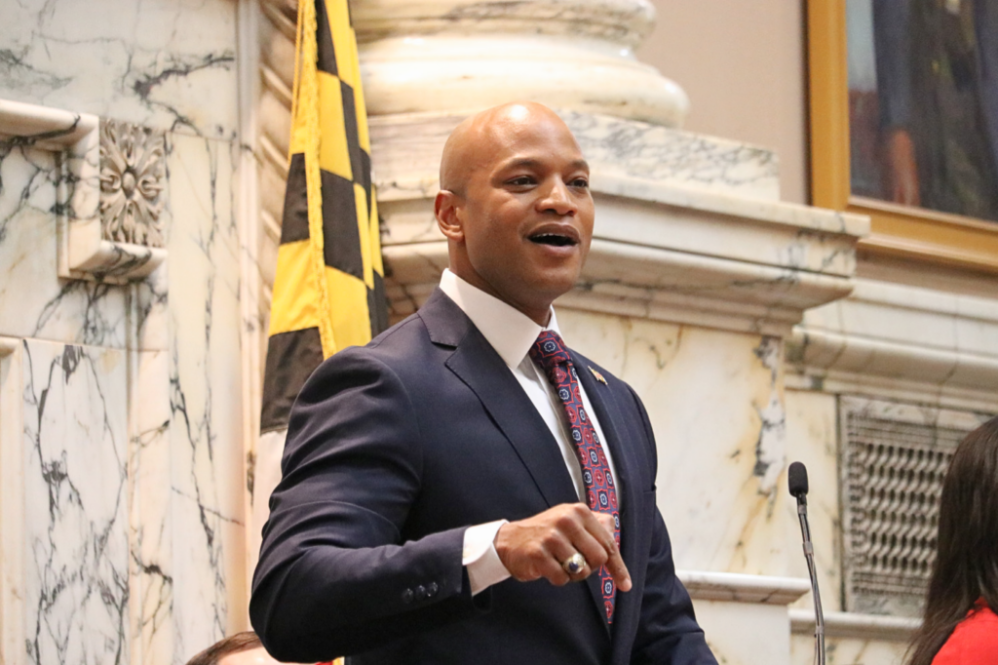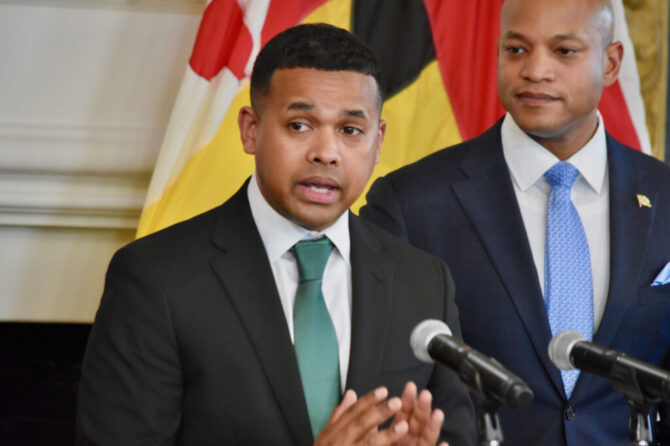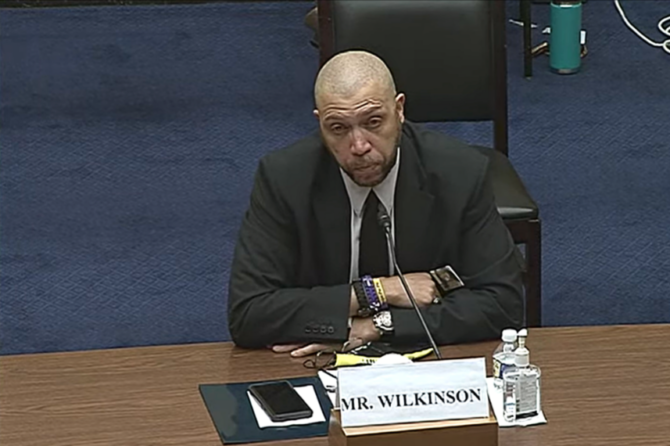MARYLAND MATTERS: Gov. Wes Moore (D), who has cast his own decision to enter politics as an extension of his lifelong record of service to country and community, used his first State of the State address Wednesday to urge Marylanders to join him on the path to public service.
Two weeks into his administration, and mindful of his trail-blazing status as the first Black governor in Maryland history, Moore touted a public service program he aims to establish for young Marylanders, and also described restocking state government as his first mission as governor. He characterized both of these initiatives as priorities that political leaders of both parties can easily embrace.
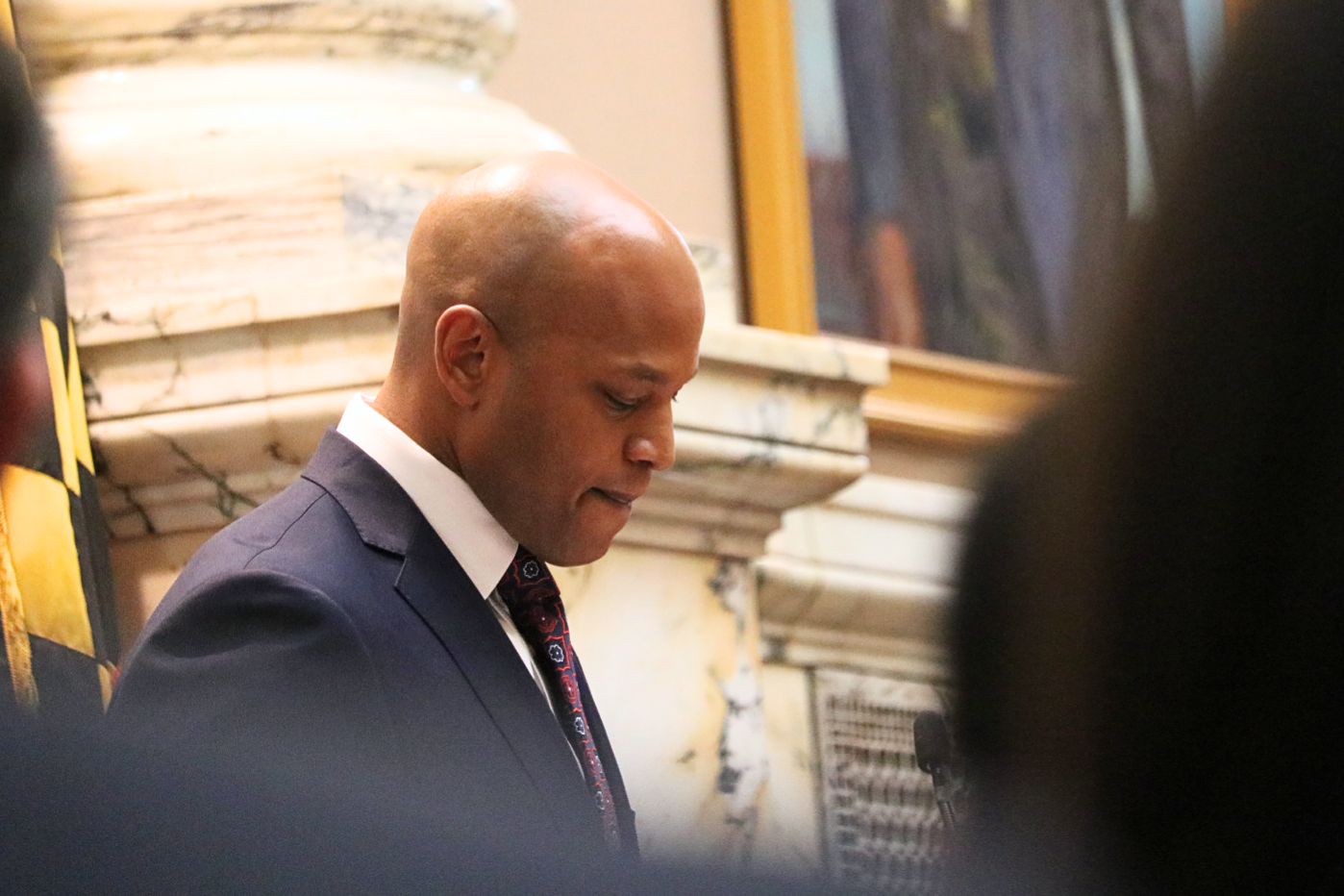
Gov. Wes Moore (D) paused during his first State of the State address Wednesday as lawmakers and dignitaries recognized his election as Maryland’s first Black governor. Photo by Danielle E. Gaines.
“I only realized recently, service, the word service, comes from the Latin, servitium, which meant ‘slavery,’” Moore began, after acknowledging the assembled dignitaries. “It is fitting, as the first African American to deliver this speech, in a building that was built by the hands of enslaved people, that we are now putting ‘service’ towards the good of all. The irony is that it is service that will help save us.”
Moore, an Army veteran who ran an anti-poverty foundation in New York before running for governor, thanked the lawmakers in the General Assembly for the sacrifices they’ve made to their family lives and careers in order to serve in Annapolis, noted the abuse elected officials often take from the public, and throughout his 45-minute speech, cast them as partners in his efforts to remake the state.
Marylanders aren’t just looking to politicians to solve their problems, the new governor asserted — they want to be part of the solution.
“Marylanders are worried about our economy, and whether it can keep pace with the cost-of-living. We worry about safety in our communities,” Moore said. “Families struggle to find affordable child care and Pre-K. People of all ages get lost in the maze of behavioral health crises and trauma.
“Yet, despite the challenges, the Marylanders I talked to were not only fast to offer solutions but expressed a deep desire to be part of the solution. They were the first to organize a food drive at their local school. They raised their hands to watch the kids in the neighborhood. They agreed to serve on the board of a local nonprofit. They are willing to work in our local government and our state government.
“In short, Marylanders are ready to serve.”
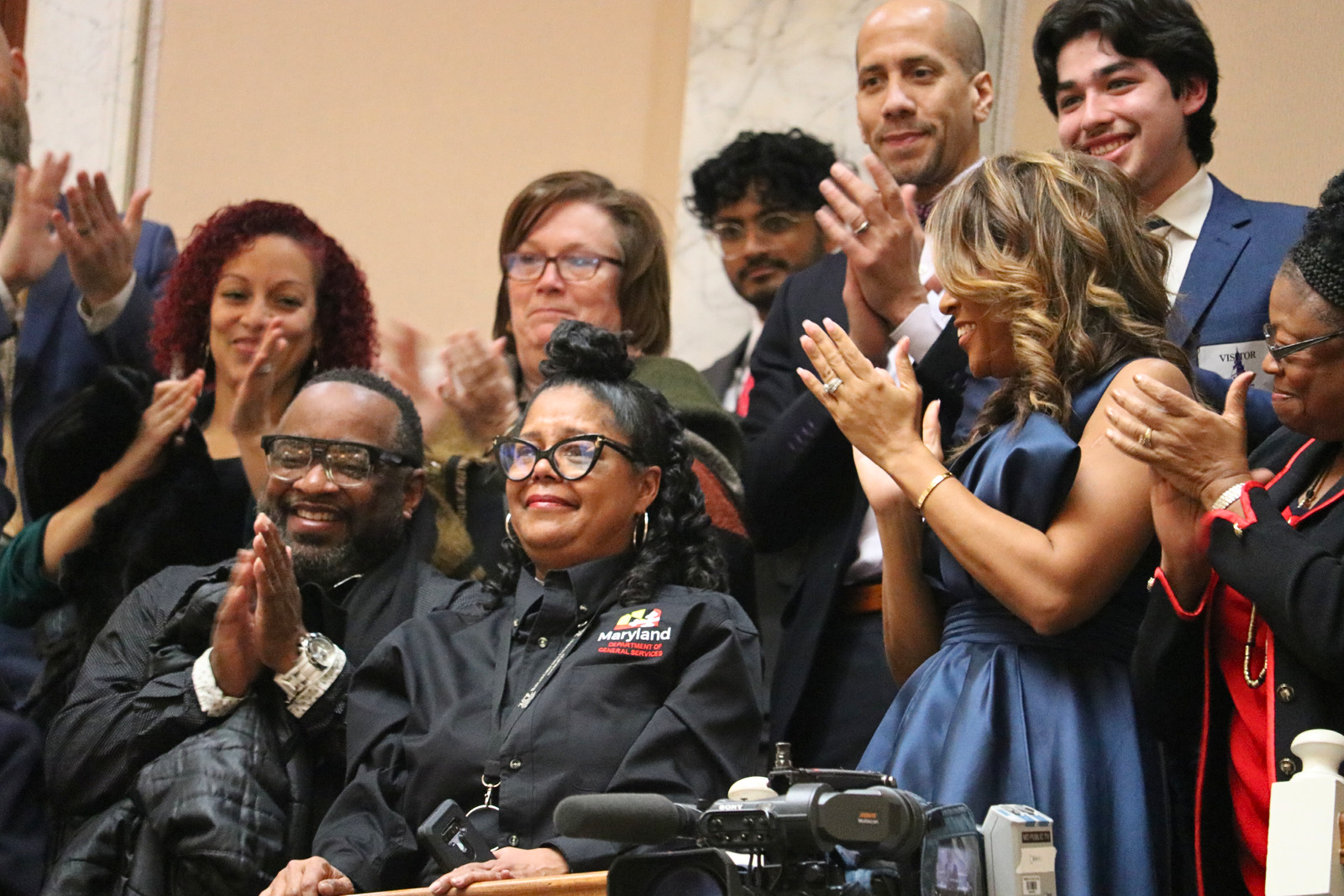
Judy Roopnaraine (center), a Department of General Services employee in the Maryland State House, was a guest of Gov. Wes Moore (D) during his first State of the State address. Photo by Danielle E. Gaines.
As he walked through some of his top priorities in the broadest terms — the governor is expected to give more details about his legislative agenda later Wednesday — Moore called out six guests sitting in the House of Delegates gallery who, he said, epitomized his call to service: A longtime employee of the Maryland Department of General Services, a teacher in Frederick County, an immigrant attending community college, a retired U.S. Air Force master sergeant, a veteran law enforcement officer, and a tech executive who grew up in abject poverty and is giving back to his community.
“This state is full of those individuals,” Moore said. “People who refuse to
quit, who lift you up when you are down, and who will spark a light in yourself even if it only glimmers in the dark. This state was built by them. Built by people who stepped up to serve.”
Moore also asked every military veteran serving in the legislature to stand and be recognized. He noted that these individuals were Democrats and Republicans.
“I’d like to quickly note that no party has the market on patriotism and sacrifice,” he said.
Moore outlined how he’ll seek to tap the goodwill and community spirit of Marylanders. He talked about his decision to create the Department of Service and Civic Innovation, to create service opportunities for younger Marylanders, and said he would follow it with with legislation, The Serve Act, that would create a service year option for high school graduates.
“This was not a stunt,” he said. “This was not because it sounded nice. This was because it is a fundamental part of who I am, and it’s in the DNA of this state.”
Moore characterized the program as an opportunity to create to learn critical skills, “create a lifelong habit of service,” and provide critical resources to the state. He said Maryland’s program could become a national leader.

A attendee takes video of Gov. Wes Moore’s first State of the State address on Wednesday. Photo by Danielle E. Gaines.
But Moore also talked at length about the imperative of rebuilding state government, which he suggested has been hampered by 10,000 vacancies — 6,100 alone in the executive branch.
“That means needs are not being met,” he said. “It means timelines for licensing and approvals are closer to the 19th century, than the 21st. It prevents our people from opening small businesses, from keeping our communities safe while welcoming back those who have paid their debts to society, from getting Marylanders the health care they need.
“This isn’t about creating ‘big government.’ This is about creating a better one.”
Moore also vowed to push through a program that recruits new teachers and boosts their pay.
In the last two weeks, 2,833 people have sent in applications to join state government, Moore said.
“More than 1,589 Marylanders have raised their hand to join a board or commission,” he added. “Untold numbers are getting involved in their local governments, their civic organizations, and creating new ones we will soon know. People are signing up to serve, and I want them to keep signing up. We can be a state that rewards, celebrates, and elevates a culture of service. We must be.”
Targeting child poverty
Moore said he was determined to eradicate child poverty from Maryland. He said permanently extending the enhanced Earned Income Tax Credit and expanding the Child Tax Credit “is how we begin. This push will make nearly 40,000 families eligible for one of the most successful child poverty tools this country has ever seen. By reducing the number of children living in poverty, and the severity of poverty, we are changing what has long determined a kid’s future before they even get a say.
“And this helps everyone. For every dollar invested in credits like these, there are up to ten dollars in economic benefit and a range of improved outcomes for communities, from higher-quality childrens health to reduced crime rates.”
Moore also called for immediately hiking the minimum wage to $15 per hour, and indexing it to inflation, a move that could “lift more than 152,000 children in Maryland to the next rung of the economic ladder.”
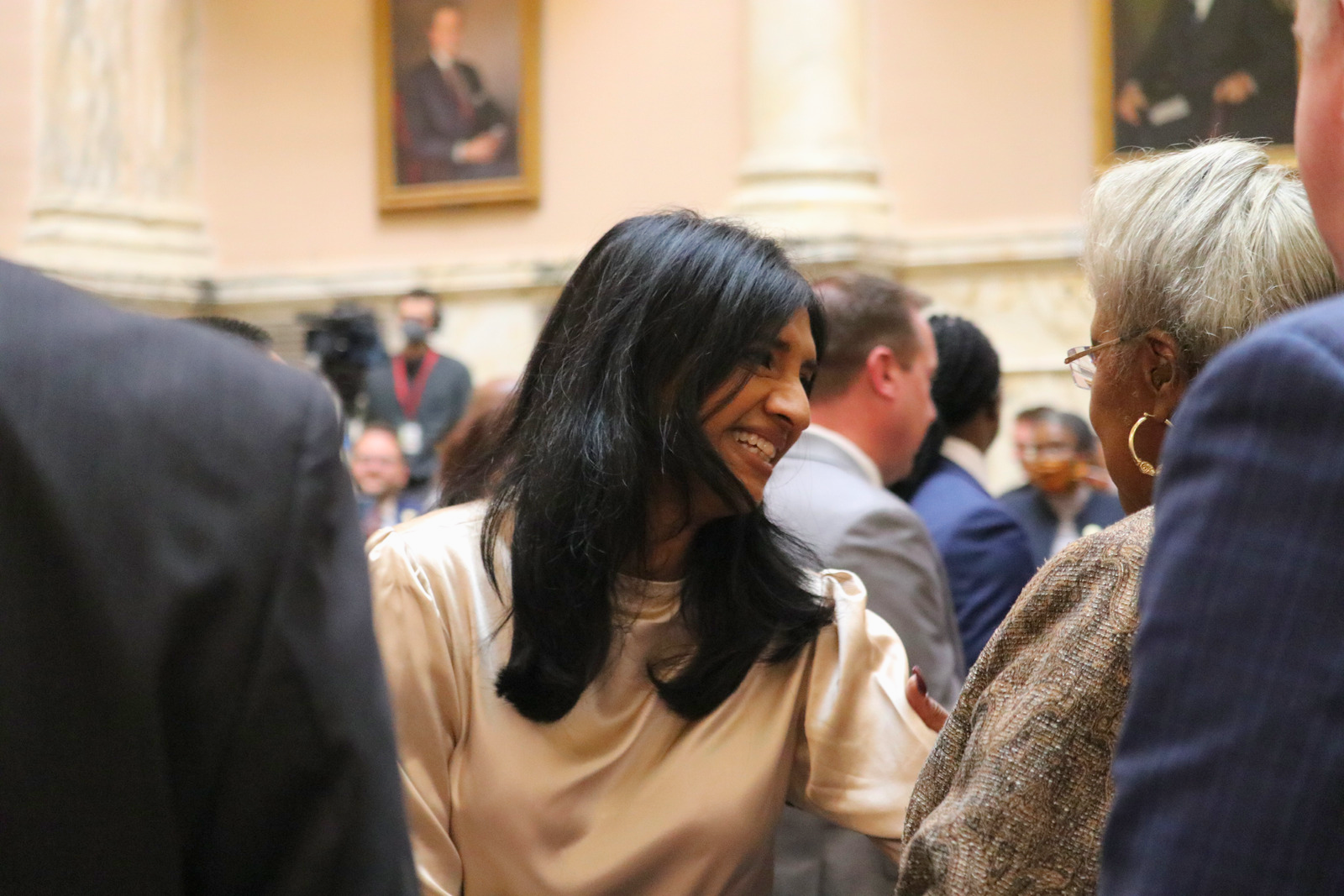
Lt. Gov. Aruna Miller (D) greets lawmakers ahead of Wednesday’s State of the State address. Photo by Danielle E. Gaines.
Moore asked the assembled political leaders to take a moment to reflect on the majesty of the moment and the awesome responsibility to their constituents that they share, because “it’s easy to get lost in the finer points of policy, or the politics of turning bills into law. It’s definitely possible to get lost in the frenetic energy of Maryland’s legislative session.”
And Moore attempted to cast his priorities as goals that can appeal to a broad swath of Marylanders.
“What I called for over the last 20 minutes or so weren’t Democratic beliefs. They weren’t really partisan at all,” he said. “These were the things we all hope for, for all Marylanders.
“They weren’t urban or rural. They didn’t apply solely to the shore or to the mountains. Because the same hope to end child poverty is just as strong in Baltimore as it is in Boonsboro. Economic mobility has a home in Dorchester, just as it does in Dickerson. Making our government more effective and efficient is an ideal held in Harford and in Howard. These are all collective goals, and collective ideas, and the only way we will accomplish them, is collectively.”
Moore’s speech was interrupted by applause and scattered standing ovations multiple times.
Lawmakers, officials react
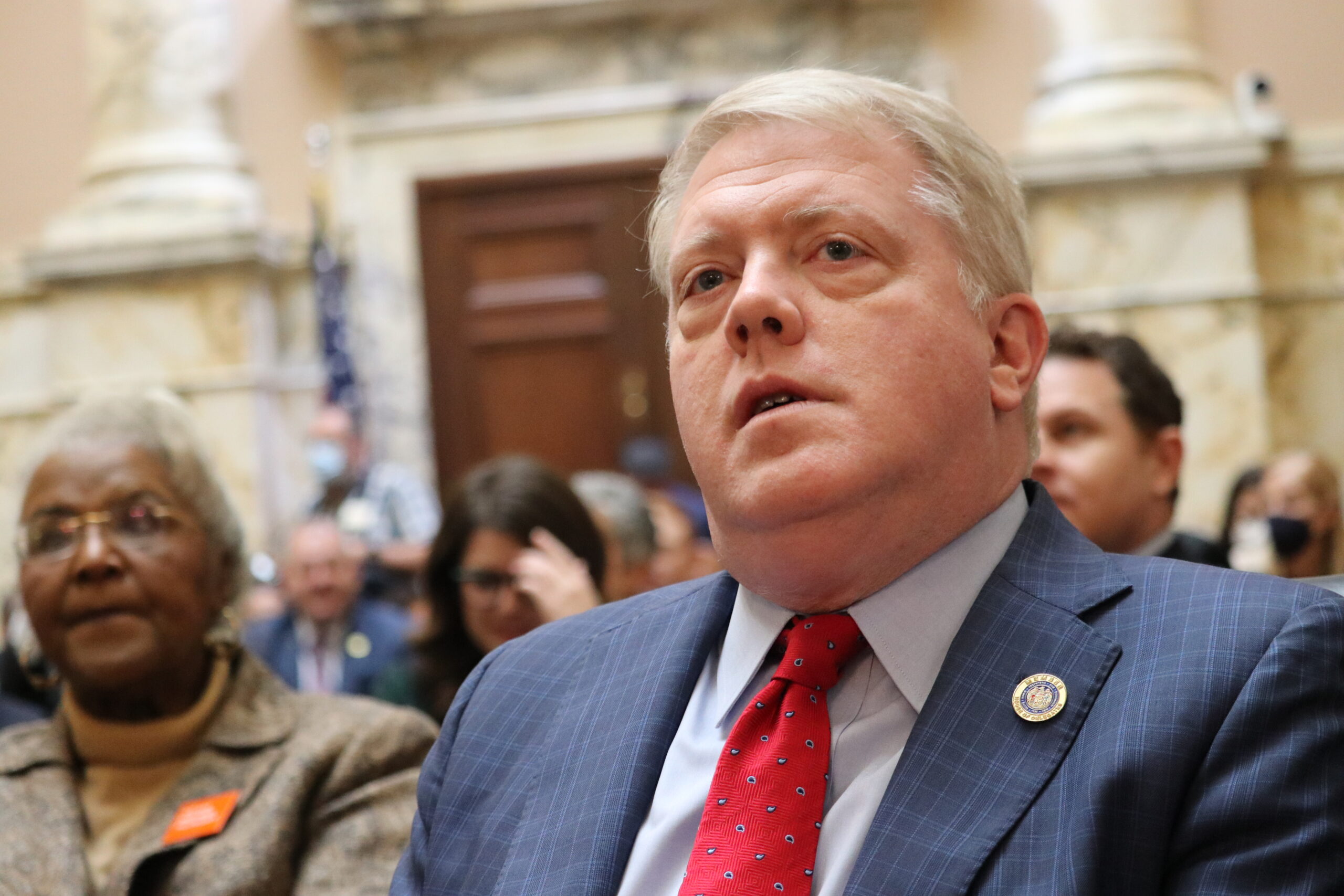
House Minority Leader Jason Buckel (R-Allegany) listened to the proceedings as Gov. Wes Moore (D) prepared to give his first State of the State address on Wednesday. Photo by Danielle E. Gaines.
But Republicans cast skepticism on some of his agenda.
Offering the Republican response to Moore’s speech, House Minority Leader Jason Buckel (R-Allegany), suggested that some of Moore’s priorities are misguided.
In a pre-recorded message from the Old House Chamber in the State House, which aired on Maryland Public Television, Buckel criticized Moore for proposing 20% cuts to the BOOST program, a state-funded scholarship program for low-income Maryland students who attend private and parochial schools. He implied that Moore’s decision was a priority of the Maryland State Education Association, the teachers’ union that endorsed Moore early in his campaign, which he labeled “one of the most powerful lobbies in Annapolis.” He said the teachers’ union views the program as “an existential threat.”
Buckel also said that Moore’s priorities don’t do enough to address violent crime in the state.
“Public safety is our number one concern,” he said. “You simply cannot build a better state – from Western Maryland to the D.C. suburbs to troubled Baltimore City to the Eastern Shore – without a foundation where serious, repeat violent criminals are investigated, caught, fairly prosecuted, and then put in jail where they serve a real sentence and not just a slap on the wrist. We hope Governor Moore breaks away from some in his party who seem to care more about the violent criminal than their victims.”
Buckel also chastised Moore for leaving some funding priorities for Eastern Shore and Western Maryland projects off the books, implying that the Democratic governor is showing a bias to more populated areas of the state, where Democrats hold sway.
“Governor Moore, please do not leave Marylanders outside of the large cities and sprawling suburbs behind,” he said.
And while Moore gave only a quick mention to the imperative to fight climate change, saying students in service programs could be part of the solution, Buckel suggested the state under Democrats has become beholden to extreme environmental positions.
“Maryland must stop following the reckless environmental policies of California and reject a foolish and economically disastrous plan to ban the sale of gasoline-powered automobiles over the next few years,” he said.
Senate Minority Leader Stephen Hershey Jr. (R-Upper Shore) said he has seen a willingness from Moore to reach across the aisle, including during Wednesday’s address.
“That’s completely honest. I have had a number of conversations with him, and I know he has talked to a number of other Republican legislators,” Hershey said. “He wants to be very inclusive. Giving an example, when he was in the armed forces, he never asked those serving along with him what their party was. So, I take him at his word for that, and I think that we will be included with what he is looking to move forward with.”
Baltimore County Executive John A. Olszewski Jr. (D) said he was “encouraged in the way the governor called on all of us to come together from different parts of the state, from different political affiliations to really solve the challenges before us.”
While Moore referenced legislation his administration plans to introduce, the text of the forthcoming bills was not available Wednesday.
Olszewski said he wasn’t disappointed in the lack of detail.
“I think it’s perfectly natural early in an administration as it transitions, to take some time to actually flesh out what those details would be,” he said. “…But I clearly have enough of a sense of where this administration’s going to be excited and encouraged and to want to work closely with them and the legislature to enact a lot of the provisions laid out today.”
Del. Ben Barnes (D-Prince George’s and Anne Arundel), chair of the House Appropriations Committee, said he was pleased that the biggest applause lines appeared to be centered around school funding and support for teachers.
“I, for one, am glad we finally have a partner in that endeavor,” he said.
Excitement in the chamber
It was clear that Democrats, after eight years of former Gov. Larry Hogan (R), were delighted to have one of their own back in charge.
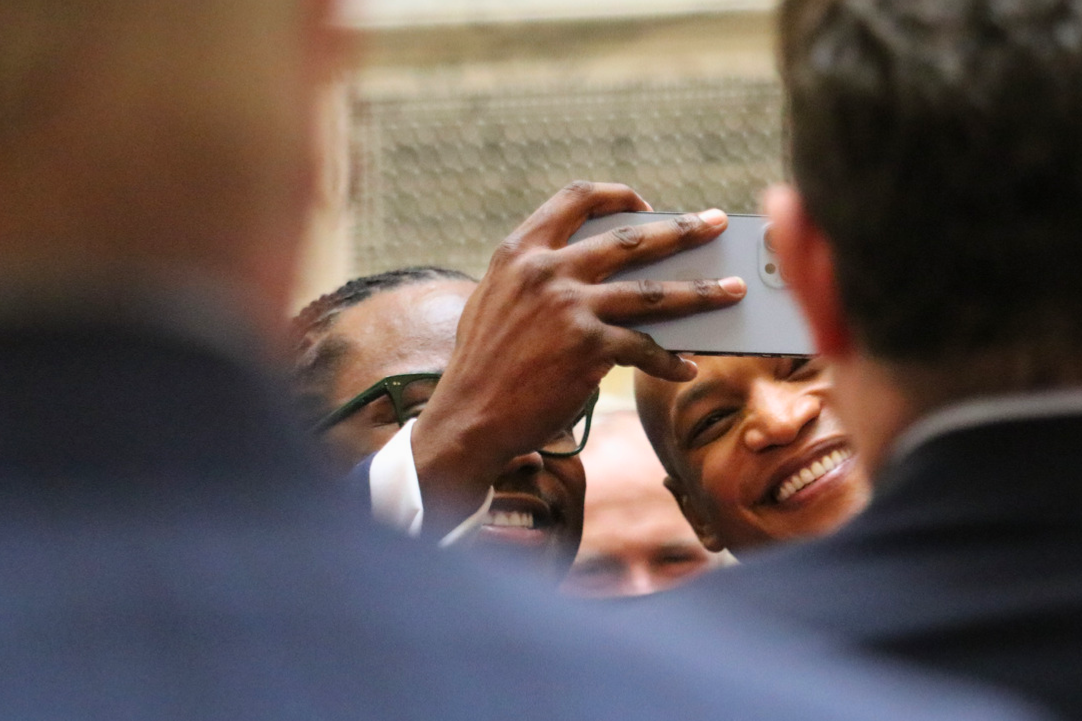
Sen. Alonzo Washington (D-Prince George’s) takes a selfie with Gov. Wes Moore (D) ahead of Wednesday’s State of the State address. Photo by Danielle E. Gaines.
As he entered the House chamber, Moore was swarmed by well-wishers, shaking hands with lawmakers, who took selfies of themselves with him, as he slowly made his way up the center aisle.
More than two minutes after entering the chamber, House Speaker Adrienne Jones (D-Baltimore County) finally stepped to the microphone, saying, “Uh, governor….”
The Speaker’s gentle reminder of the reason he was there drew laughter and applause.
And when Moore finally made it to the podium, it drew a louder round of applause.
“Good afternoon, good afternoon,” Moore said, leaning into the microphone, after he rushed to the rostrum.
Yet he continued to shake hands with the elected officials who had been seated immediately in front of him on the dais.
“Please, please take a seat everybody. Please take a seat,” he said. “Good afternoon.”
He turned to look at Jones.
“I apologize, Madame Speaker,” Moore said. “It will not happen again. I promise, next year will be a little bit faster.”
Photo: Gov. Wes Moore (D) delivered his first State of State address in the Maryland House of Delegates chamber on Wednesday. Photo by Danielle E. Gaines.


